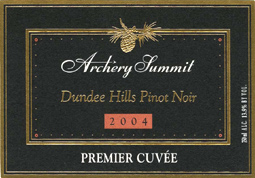

Archery Summit
2004 Pinot Noir Premier Cuvee(Dundee Hills)
Premier Cuvee could be considered Archery Summit’s “entry level” wine. If so, it is a grand entry. A hand-and-tongue blend of vineyards, clones, and barrels, the Premier Cuvee typifies the red fruit character of Pinot Noir from the Dundee Hills appellation — the original source of Oregon’s Pinot Noir industry.
The vineyards that went into this wine are all on Jory soil: red colored and volcanic, it is famous for the red fruit and mineral characteristics that show up in the Pinot Noir wines it produces. Add Archery Summit’s dense plantings — up to 4,800 vines to the acre — to the naturally low yielding 2004 vintage, and you get wines of great concentration and expression — and relative rarity.
The 2004 Premier Cuvee has a delightful cherry/ruby color and a nose that shows rose petal, cherry, and light sandalwood overtones. The palate is remarkably silky, with forward and fresh feeling red cherry flavors, backed by an aromatic sense of cedar and tobacco, anise and baking spices. While not deeply complex, it is appealingly forward, and ripe for drinking in the near term.
Yet this is not a soft wine that requires current drinking. In keeping with the Archery Summit style, there is plenty of density, barrel overtones, and rich fruit. This is a wine that can easily be cellared for additional maturation, or drunk now for easygoing pleasure. And, at $37 a bottle, it is the least expensive option for sampling one of Oregon’s best known Pinot Noir producers.
Reviewed August 3, 2007 by Cole Danehower.
Other reviewed wines from Archery Summit
The Wine
Winery: Archery Summit |
The Reviewer Cole Danehower
Cole Danehower
Cole Danehower is the creator of the Oregon Wine Report. A frequent judge and a member of Northwest Palate magazine’s review panel, Cole's palate is particularly attuned to Northwest wines. He believes numerical scoring is inadequate in conveying the character of a wine, preferring to communicate his experience and evaluation of a wine through words. A believer in terroir (especially in Oregon's cooler growing regions) he also pays attention to the impact of winemaking style and vintage variation on a wine. He views balance, flavor purity, and a sense of character as key vinous virtues. |














